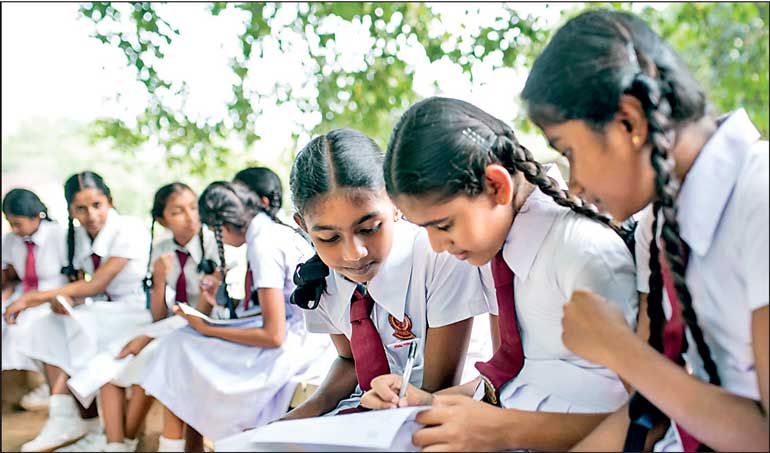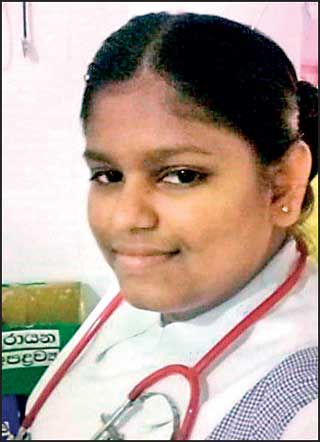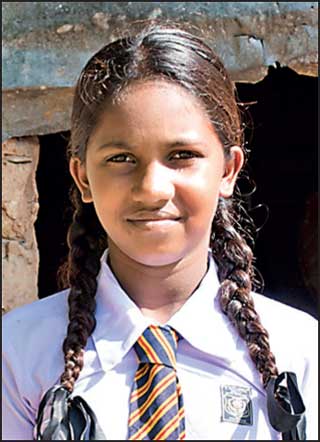Wednesday Feb 18, 2026
Wednesday Feb 18, 2026
Thursday, 16 June 2022 00:00 - - {{hitsCtrl.values.hits}}

 |
| Niluka |
 |
| Nimeshika
|
Sri Lanka’s net female enrolment in secondary education by 2019 stood at 92%, according to UNESCO statistics. It is an indication that women in Sri Lanka receive equal access to education. Yet only 34% of women are engaged
in Sri Lanka’s workforce. Sri Lanka’s female representation in the Parliament is only 5%. The staggering drop in women’s numbers in the labour force and leadership demonstrates that, despite receiving equal opportunity in education, the same cannot be witnessed in the labour force. One solution to this problem can be found by teaching life skills.
UNICEF defines life skills as knowledge, attitudes and the ability for adaptive and positive behaviour that enable individuals to deal effectively with the challenges of everyday life. When adolescent girls learn life skills, it helps them to shape their personality, build confidence and advocate for themselves through effective communication. Life skills help girls build leadership skills, critical thinking, have financial knowledge, set goals among many others, that will support them to engage in skilled work and navigate their progress in career and life through informed decisions.
One organisation that has prioritised teaching life skills for girls in secondary education is Room to Read. Room to Read is a global non-profit organisation that works on transforming the lives of millions of children through quality education to alleviate illiteracy and gender equality around the world. Since been founded in 2000, Room to Read has facilitated more than 32 million children and has worked in 21 countries around the world to help young learners unlock their full potential through education. Its work in Sri Lanka began in 2005 and has so far transformed the lives of over one million children in the country.
Room to Read’s Girl’s Education Programme helps girls in under-resourced communities complete secondary education with relevant life skills and financial literacy to succeed in school and beyond. In its life skills curriculum, Room to Read teaches students to learn self-awareness, social awareness, financial awareness and self- efficacy. The organisation also provides technical expertise to train government teachers on how to teach life skills in the program and has women mentors in local communities to help students learn life skills through individual and group mentoring and continue their education.
Meet Nimeshika. Nimeshika joined Room to Read’s Girls’ Education Program in 2018 at the age of 13. Nimeshika’s parents were barely literate. Her father was an alcoholic. Nimeshika’s family was facing extreme poverty for not having a sufficient, regular income and were barely having two meals a day. Her family was ignored the by the rest of the villagers due to their lineage and since they were new settlers. As a result, Nimeshika grew up to be an angry child. She always fought with her colleagues in school. They ridiculed her in return, laughed at her complexion. Unable to cope with the bullying, Nimeshika nearly dropped out of school. Thanks to Room to Read’s Social Mobiliser noticing Nimeshika’s absence in school and understanding her home environment, Nimeshika received help to go back to school and participate in Room to Read’s individual and group mentoring life skills sessions. Through life skills, Nimeshika learned how to manage her emotions, interact and work together with her colleagues, and have the confidence to stand up for herself.
Today, Nimeshika is a student who is determined to complete school and attend university one day. She also makes time to help her younger sister go to school every day, having understood the value of quality education and how it transformed her life. “Thanks to learning life skills via Room to Read, I have lots of friends in school now. I help both my sister and mother at home. I never cared about anything before. Now I have goals in life and I want to become a doctor one day,” says Nimeshika.
Niluka was another student whose life transformed thanks to learning life skills via Room to Read. Niluka joined Room to Read’s Girls’ Education Program when she was in grade 10. At the time, her literacy skills were below average and she could not understand what’s taught in school. Since this affected Niluka’s daily learning, Room to Read’s Social Mobiliser enrolled her in Room to Read’s Literacy Program taking place in the same school for primary grade students, to improve her ability to read and write with comprehension. Although this supported Niluka to improve her studies, she still wasn’t up to the expected standard by the end of the year. As a result, Niluka failed grade 10 in school. With one failure, Niluka dropped out of school to save herself from embarrassment.
After much persuasion by her Social Mobiliser by visiting her house, convincing the parents and through individual mentoring, Niluka finally started going back to school. Her Social Mobiliser gave her additional individual and group mentoring life skills lessons. During this time, Niluka understood the importance having goals in life. This time, she began to work on her dream of becoming a nurse. After finishing A/Ls, Niluka applied for a training course immediately and today, she gets to live her dream by working as a nurse in a national hospital.
Teaching life skills to adolescent girls can contribute to systematic transformation in themselves, their families and communities. When women learn life skills, it contributes to economic growth in the country by enhancing their employability and labour productivity. It allows women to be more competitive, financially aware and overcome gender-based challenges. Investing in quality education and life skills in women will help create an inclusive society where women can compete through skills in school, careers and in life. This, in turn, increases the employability and productivity for both the current and future workforce.